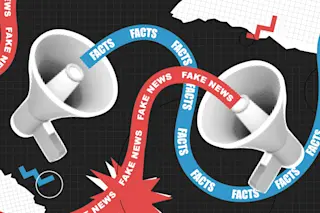Spite takes many forms. You might take a little longer at the self-checkout when someone is waiting. You might increase the TV volume when someone complains about the sound. And you might turn to conspiracy theories. According to a new study in the Journal of Social Issues, that’s a distinct possibility, as spitefulness plays an important part in conspiracy thinking.
“Spite is the desire to ‘level the playing field’ by trying to knock someone else down,” said David Gordon, a study author and a researcher and lecturer at the University of Staffordshire, in a press release. “Conspiracy theories can serve as a way for individuals to satisfy this desire through rejecting expert opinion and scientific consensus.”
Read More: How To Tell If A Conspiracy Theory Is Probably False
Whenever we deliberately dismiss an evidence-based explanation for an event or a series of events in favor of an implausible, illogical, or ...















